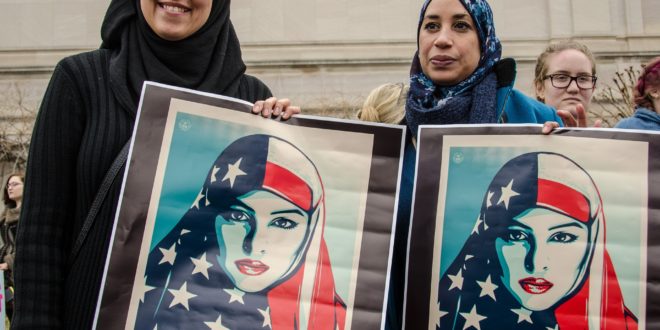In light of the changes taking place in the United States, Arab Media & Society asked Dr. Sahar Khamis her thoughts on how the Arab and Muslim communities in the US have been affected.
1) What was the most notable effect of Trump’s policies on the Muslim community in the US? What is the aftermath of the increased divide and sentiments of hatred that were fostered by the previous administration?
S. K. It is not an overstatement to say that Trump’s era was a nightmare for minorities, including Arab-Americans and American-Muslims. According to CAIR, the Council on American-Islamic Relations, the leading Muslim advocacy and civil rights group in the United States, hate crimes steadily increased against the American-Muslim community since 2016, which was the worst year on record for anti-Muslim incidents since the group started documenting such incidents in 2013. These hate crimes took different forms, including physical attacks on mosques and Islamic centers, bullying in schools, and physical and verbal attacks against Muslims, especially those who have a “visible” Muslim identity, such as women wearing the hijab.These unfortunate incidents paralleled, and mirrored, a surge in equally unfortunate discriminatory policies by the Trump administration. They included the first and second “Muslim Travel Ban,” which restricted entry to the United States from seven Muslim-majority countries; attempting to create a Muslim registry in the United States; and placing more Muslims on “no fly lists,” to mention a few examples. Although Trump is gone, the era of “Trumpism” induced long-term effects, threatening the national cohesion and solidarity in the United States. An unprecedented wave of deep polarization and fragmentation was exacerbated by excessive hostility and fear of the “Other,” as exemplified in the surge in xenophobia, Islamophobia, anti-Semitism, and racism. It takes a lot of courage, hard work, perseverance, and collaboration to overcome these interrelated challenges.
2) What changes do you think the Biden administration will bring to the Arab communities in the US? Are there policies or specific sectors that you think should be a focal point in the coming months?
S. K. During his presidential campaign, President Joe Biden promised the American people that his new administration will reflect America’s greatest asset: the diversity of its social fabric. He said that he will be “a president for all Americans,” and that his administration “will look like America.” Biden fulfilled his promise of being a vocal advocate for diversity by ensuring that every ethnicity and background are represented in his new administration: African-Americans, Hispanics, Asians, and, finally, Arab-Americans. So far, there have been seven Arab-Americans, three of them women, selected to join his administration, and more are expected to follow. Biden’s efforts to reach out to Arab-Americans, and American-Muslims, during his presidential campaign paid off, as he received overwhelming advocacy and support from these communities throughout the United States. In fact, roughly 59% of Arab-Americans supported Biden in the November 2020 election, compared to only 35% who supported Trump. Also, 69% of American-Muslims supported Biden, compared to only 17%, who supported Trump. I believe that Biden’s inclusive policies in many domains, including immigration, ushers a new dawn of hope for all minorities, including Arab-Americans and American-Muslims. However, I also believe that these communities have a big responsibility and a significant role to play, taking this golden opportunity to raise their voices and to ensure that their demands are heard. This requires their involvement in more public service, community engagement, and political participation, on all levels.
3) How have the Muslim-American and the Arab-American communities responded to the Capitol riots in January, bearing in mind the varying backgrounds of the members of these communities?
S. K. There was a unanimous sense of shock, disbelief, dismay, and anger among members of both communities when they watched these unbelievably disturbing scenes at the Capitol on January 6th, 2021. We are all “Americans,” despite our different backgrounds, ethnic origins, orientations, and political ideologies, and we can never accept, or justify, such resentful, hateful and violent acts, under any condition. We are very grateful, and proud, that American democracy and rule of law prevailed, at the end of the day.
4) What broader impact does a democratic President have on the Arab world at large? Do you see it affecting Islamophobic trends overall?
S. K. I believe that President Biden with his extensive political experience, long career, wisdom, and diplomatic skills will reinstate the United States’ position of diplomatic leadership on the international stage, through helping it regain its credibility as the leader of the free world. This entails opening a new chapter of American foreign policy, which does not signal a green light to authoritarian regimes around the world, including in the Arab world, to commit human rights’ violations with total impunity and zero accountability. A few good recent examples are stopping U.S. support of the war on Yemen and releasing an unclassified report about Jamal Khashoggi’s horrific murder case to Congress. I am optimistic that this is only the beginning of a different tone for American foreign policy in the Arab region, and beyond. As for the impact on Islamophobia, President Biden fulfilled his promise by repealing the “Muslim Travel Ban” on the very first day of his presidency, along with a number of other campaign promises which he also fulfilled. However, Islamophobia—defined as excessive, and irrational, fear of Islam and Muslims—is, indeed, a complex and multifaceted challenge, which requires equally multifaceted efforts to combat, educationally, socially, culturally, and politically. It takes more than just changing laws to change people’s attitudes and mindsets, and “it takes a village,” as Hillary Clinton likes to say, to change their behaviors and actions. This work is just beginning, and it cannot be accomplished without solidarity, cooperation, and coordination between American-Muslims and others.
5) With Covid19 being the focal point of the media last year, have there been overlooked issues or policies that have impacted or will impact the Muslim community in the US that are not being sufficiently covered or not covered at all by the media?
S. K. There is no doubt that the Covid19 crisis had huge effects on the entire world, but most of the brunt of its negative consequences impacted underprivileged communities, especially minorities and people of color, such as African-Americans and Hispanics in the United States, which suffered the highest infection and death rates from this terrible pandemic, so far. Taking into account the diversity of the American-Muslim community, which includes different races, colors, and ethnicities, one must acknowledge the dire effects and negative consequences of this pandemic on members of this community, especially African-American Muslims, who constitute twenty percent of the American-Muslim community. The same could be said about members of this community who suffer from economic hardships, have an undocumented legal status, and/or are recent immigrants or refugees. One silver lining amid this dark Covid19 cloud has been American-Muslims' engagement in a lot of philanthropic activities and community service to help not just fellow members of their community, but the American society at large, through a plethora of methods, including food drives, donations, fundraising, and supporting homeless shelters, among others. Unfortunately, however, there is not enough publicity or media coverage to showcase these significant American-Muslim philanthropic efforts or community service activities. In my opinion, “it takes two to tango,” as the saying goes, so it is important for the media to do its part by reaching out more to the American-Muslim community to highlight these excellent efforts. It is also equally important for American-Muslims to reach out more to the media to share their stories and to showcase their remarkable efforts. I cannot think of a better formula to combat Islamophobia!
6) What kind of policies will the democratic-led government pursue in the Middle East? Will they revert back to the policies of the Obama-era?
S. K. I expect a balanced policy, which strives to protect and safeguard America’s strategic interests in this important region, while upholding the values of protecting human rights and holding autocratic regimes responsible for their crimes against humanity and their many transgressions. President Biden said “America is back,” and I believe it is. He highlighted the importance of America’s democratic and moral leadership globally, and I think there is no better time for it than now.
 Arab Media & Society The Arab Media Hub
Arab Media & Society The Arab Media Hub





